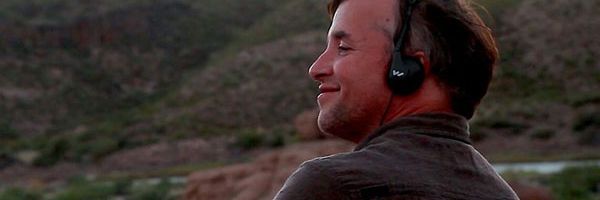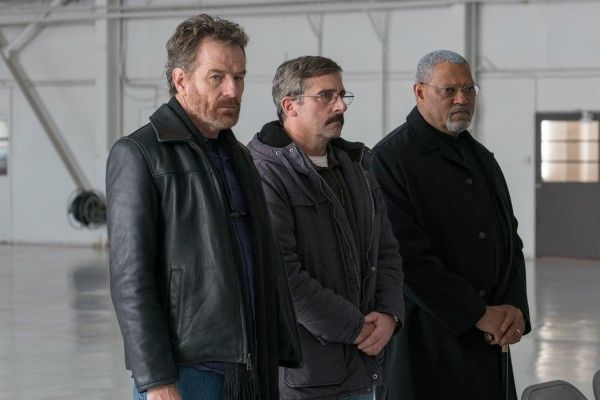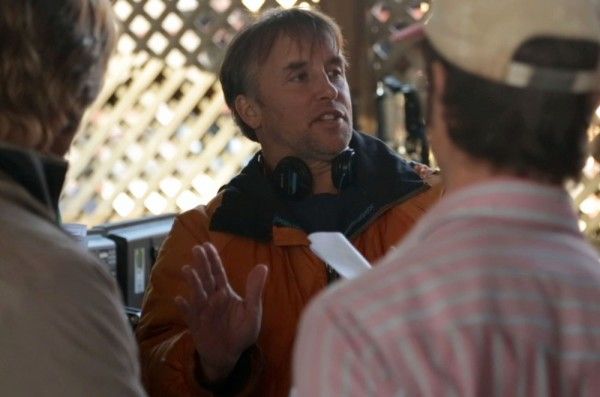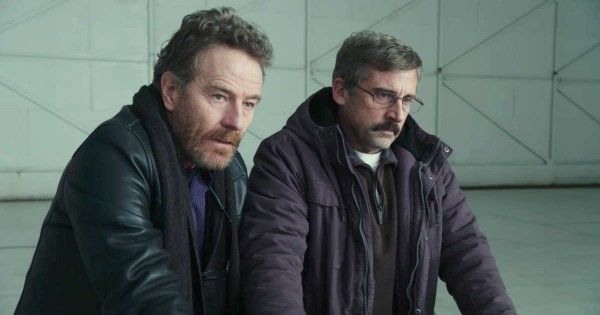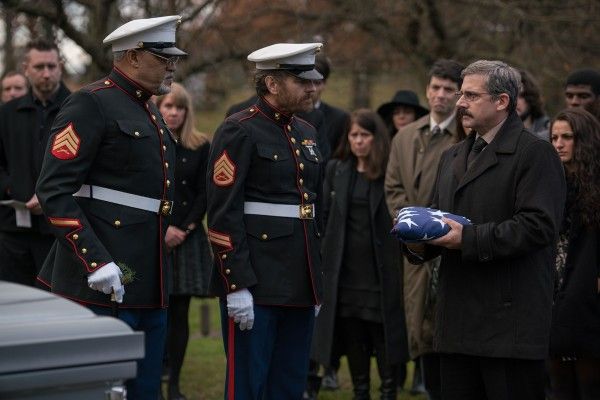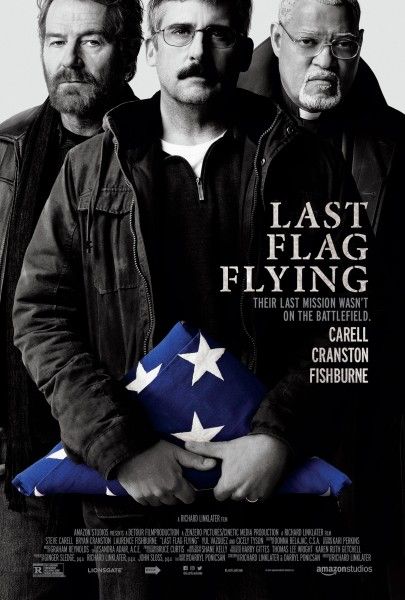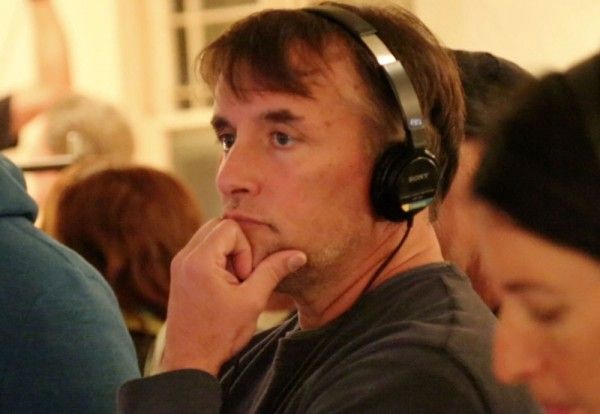Now playing in limited release is director Richard Linklater’s fantastic new film Last Flag Flying. Based on the novel of the same name by Darryl Poniscan, the film takes place in 2003 and follows three Vietnam War veterans played by Bryan Cranston, Steve Carell, and Laurence Fishburne who reunite under unfortunate circumstances. The son of Carell’s character has just been killed serving in the Iraq War, and instead of burying him at Arlington Cemetery, he enlists his veteran buddies to help bring the casket up the east coast to suburban New Hampshire.
The other day I got to talk with Richard Linklater about the making of the film. He talked about the genesis of Last Flag Flying, why it’s an exciting time for filmmakers, landing his fantastic cast, getting from his first cut in the editing room to the finished film, and a lot more. In addition, he talked about his next film, Where’d You Go Bernadette, which stars Cate Blanchett.
Check out what he had to say below. You can also read Chris Cabin’s Last Flag Flying review here.
Collider: I've talked to you in the past where sometimes you've mentioned that it's surprisingly difficult for you to put together financing or get a movie off the ground. Was this a project that was easy to get off the ground? Can you talk about the genesis of it all?
RICHARD LINKLATER: Most aren't. This is another one that lingered for 10 years. Didn't really achieve liftoff 10 years ago, 10 or 11 years ago I think. It was '05, '06. It just wasn't meant to be at that time, I don't think. The Iraq War was still real fresh. It was an open wound. Now, I think it's a scab so people are ready to think about it a little more now than they were then. That probably helps the most. But it never really went away. I always thought, "Oh that's the movie that's time is going to come," and sure enough it did. I just sent the script to Amazon. Ted Hope, who I've known forever, he just asked me, "Hey we should do a movie together," and I'm like, "Here, check this out. I've always thought this was ..." He said, "Yeah, yeah. I like that one." The time had come for that, so that's what gave me an in. You got to deal with the reality of what you're hearing back about your scripts and projects, but it is satisfying when the planets align and actually you get to make it and thank god for the -- We're in a good era. It's a lot better than it was seven years ago, whenever. The industry's in a better place now because of Amazon Studios and Annapurna and there's Netflix. I don't know. It's just a much better place right now than it has been in the past.
From my perspective, I totally agree with that because it seems like there are films being made that were struggling to be made even a few years ago but now with all the distribution channels and everyone wanting to work with filmmakers and actors and telling stories that don't have to be put on a 4,000 screen release. The P&A costs are very difficult.
LINKLATER: I'm so relieved because there was a time it looked grim. Like, oh my god if it's not a big tent-pole it's not going to exist. Are we witnessing an extinction? [Laughs] I was practically thinking that. I remember those years, 9-10, whenever ... Post-financial crisis, whatever was affecting everything. I'm so happy and relieved for the indie spirited film world because … I don't even know if it's indie, it's just alternative cinema that's just not ... It's just different than what the studios are doing and it's a big variety in that category, but I think I'm so thankful and I think the world is thankful too because these stories can get made. Everyone always is complaining about the film industry but I think it's important to acknowledge when it's actually a pretty good time when that comes back around. I'd be remiss not to say, "Hey, it's a pretty good era right now for these reasons," and maybe that doesn't last or maybe it does, but I will acknowledge it.
As I was watching the movie, I couldn't help but notice that you put your protagonists on a train, and of course I'm immediately thinking Before Sunrise.
LINKLATER: Trains and cinema, they have a pretty long history together.
I'm teasing.
LINKLATER: That's just the road movie aspect.
Totally. Being serious, you managed to get three great actors together and the film works because you care about these people and the dialogue that they're saying, the road trip. Can you talk about the casting process? How’d you get all of them involved?
LINKLATER: Yeah, you just come up with a wish list and even though I hadn't worked with -- The only one I'd worked with before was Quentin Johnson, who played young Washington. The others I just got lucky that they responded to the material and wanted to work on it. It usually starts with a phone call. You talk or then there's a meeting. You feel your way through it and then there's always scheduling. Can you do it here, then? I just feel very blessed it came together with my top guys here, and they're all so wonderful. The best thing is I could tell they really wanted to work with each other. Each one said, "Oh, the other two, I really want to work with them. That's really interesting." I had these guys who really respected one another, really wanted to work with each other. We all really worked well together. It required it. It was such an ensemble. It felt right. Very blessed.
From when you got them involved to what people see on screen, did stuff change along the way as a result of a read-through or rehearsals?
LINKLATER: Normally my process is to sit in a room and read it and talk about it and ask questions and just create a dialogue. That goes all the way through shooting. We knew the line ... All kinds of thoughts and ideas can find their way in there. As long as you're all on -- We're just all trying to tell the story so my job as a director is just to find out what this film wants to be based on, it's just words on a page at some point but then it just needs to go to some level of believable storytelling. I'm discovering the film as I make it, to some degree.
How long was your first cut compared to the finished film?
LINKLATER: I have about an extra 30 minutes in there. I thought that was pretty good. I had a really nice 2 1/2 hour version that was just ... but you watch it and you go, "Okay, here's the redundancies." You're on a train and there's a long conversation and then they talk about that somewhere else and they do that, do we need that? It's a lessening of everything, but I didn't cut out ... That's a real lengthy process for me and my editor, Sandra [Adair]. I just keep screening it for four people in the editing room and every time I watch it knowing other people are watching it too, we just find things. We'll be months into the process and go, "You know, we could just cut it right there and cut there and save 30 seconds and you'd never know it." It's like, "Okay, why did it take so long to discover that? It's so obvious now." It just takes time. You just got to hang out with your film and keep shaping it. To me that's just honing the storytelling and the pace. That seems to be a challenge on every film. I get better at it, but I guess I do trust the process.
It's funny because I've spoken to so many filmmakers and they all talk about the editing process and no one says ... It's very rare for me to talk to a filmmaker who says, "Oh the editing on this one was really easy."
LINKLATER: [Laughs] No. I don't know there's such a thing as easy editing. Because it's like, is there an easy script to write? Not really. You can do it quicker than others maybe sometimes but it's never easy, easy. It's a big process. It definitely takes time.
You mentioned that you show it to 4 people at a time in the editing room. Is that typically your process when you're editing or do you ever do a bigger friends and family screening or even test screenings?
LINKLATER: No, I give bigger ... I'll do bigger screenings too, but I just like to know. Editing rooms are kind of, by definition, a bubble of you and the editor and what you're thinking. It's a truth-telling thing to watch it through someone else's eyes, is to get another level of real with your material. Like, "Maybe that's not that funny. Maybe that's not as interesting. Maybe that's redundant to something else. Maybe we can cut down." I don't know. It's a brutal, honest process. You've got to be pretty -- You can't be sentimental. You have to be. It's a cold process. You can't be nostalgic. You have to make those tough decisions.
When I was watching the film, there's a scene where they're buying cell phones in New York City and I would swear the girl selling them the phone was either breaking or ready to break and it seemed like Bryan was improvising a little bit and the guys were having so much fun. Was I wrong, number 1, and number 2, was that a lot of the filming process where they were having fun with each other with the dialogue?
LINKLATER: I think they were definitely having fun and that felt that way but no, that was all scripted and rehearsed and everything.
Really, because that girl behind the counter just was smiling. I was looking at her. Maybe that's just me.
LINKLATER: No I'm glad you felt that way but no, we did the same thing over and over.
There you go. That's good acting and good directing.
LINKLATER: [Laughs] I hope so.
Over the last few years, do you feel like it's been a little bit easier for you to maybe get films made or what have you been thinking about in terms of future projects and genres you might want to take on?
LINKLATER: Yeah, I just shot a film this summer, Where'd You Go, Bernadette with Cate Blanchett. Excited about that. I'm already in post-production on that. That'll be out next year. I'm happy to be getting -- That's another film been trying to get made for a while. I have a nice stack o' projects. I'm working on something else. That's what I've been doing for 25 years is trying to get the next one made. Whenever that gets easier. It's satisfying to get these things made.
If I could do a follow-up, what was it about Where'd You Go, Bernadette that made you say, "I want to make this film”?
LINKLATER: Just what the film is about. An artist who stopped creating mid-life. Someone who's blocked, someone who's ... It's very funny. It’s a portrait of a woman, too. Reminded me of my mom. It's like a portrait of my mom, to some degree.
You also put together a hell of a cast for that film. I'm very happy that you've been able to land such great actors for your projects.
LINKLATER: What a blessing. I can't tell you what it's like to just work with -- I've always loved actors and working with them. It's just great to mix it up with ...Anyone who's talented and loves what they're doing, I want to work with. People like Cate Blanchett, there's a genius there that not many possess.
Completely. She is definitely what you would call talented.
LINKLATER: God. Once in a generation talented.
She's unbelievable.
LINKLATER: League of your own talented.
Completely. Does it ever get old, people asking you about the Before Sunrise trilogy and wanting to see more with the characters or are you.
LINKLATER: I don’t know. It's a natural question. Where at about a 5 year gap I think it's about the time we start thinking of another but I don't know. No ideas. For those who care, that means ... It seems to have its followers.
One or two people might like it.
LINKLATER: I don't remember. I don't think so. I don't think the last one did that well at the box office.
Fuck the box office, the movie's amazing.
LINKLATER: I know, I'm kind of kidding. None of them did well at the box office. That was never the determinant of whether we do it. That was the joke the second time we did it. It was like, "The lowest-grossing film to ever spawn a sequel."
[Laughs] That goes back to what we were talking about earlier which is that there's so much opportunity now for films like that, that 10 years ago it just wasn't there. The distribution channels have really enabled films that don't have to hit all four quadrants.
LINKLATER: I know. No, that's what makes it a very exciting time. If filmmakers ... It's an adjustment, perhaps, to say, "People might not see this in the theater first." I mean, I’m lucky. Amazon Studios, they're a studio, they're putting out Last Flag Flying in theaters. It's a full theatrical run but long term, you're kidding if you didn't think people are going to watch this on Amazon Prime and that kind of thing. That's okay. If you make a film for Netflix, it's going to ... There's the upside of that. You just got to get used to it. Saturday night, but it's a lot of people.
I do have to ask you as a filmmaker do you take issue with people watching your films on an iPhone or an iPad or whatever portable device they have, or are you at the point where you just want people to see it?
LINKLATER: We all, especially ... I don't know if all filmmakers, definitely my generation and beyond, you grew up in theaters and when you make a film you think of the theatrical experience. You think of that big screen in the darkened theater with a lot of people, so that's always the thought behind it. If that's the case, it's nice if that's available. That's great, but I don't really mind if they're watching -- I've talked to so many people, "Hey, I saw your film on a plane," and I go, "That's great." I like watching films on a plane. If I'm flying to Europe or something, I'm going to watch a couple movies. It's pretty intense. It's right there in front of you. It's okay. I don't mind. Anybody who just wants to watch a movie, I can't complain. I don't mind. If that's the way they're going to watch them, that's the way they watch them. Who am I to judge?
My last thing for you, I know over the course of the last decade or two you must have written a bunch of scripts or had ideas for other projects. Are you the type of person that does have scripts in the desk that have been waiting to get the financing? Things that you've always wanted to do?
LINKLATER: Oh, yeah. Definitely. Stack o' scripts.
Is that something that you're trying to work towards now? Push through these films. I'm sure that Amazon or Netflix or all these companies might be talking to you about future stuff.
LINKLATER: [Laughs] No, like I said, it's a good time. I hope to get these made and live long enough to make them all. Look, I'm in post on a movie and this one's coming out, so I'm working about as fast as I can, responsibly and professionally. I've shot two films in the last 12 months. I'm in post on another, so between me and you, yes, I intend to keep doing this because I have a lot of films to make but you never know how it all plays out, but that's the goal.

